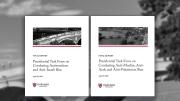The Office of the Provost today announced the first University-wide policies against bullying and updated its policies on non-discrimination, effective September 1. “There are very few University-wide policies,” said Chief Diversity and Inclusion Officer Sherri Charleston in the announcement. That these guidelines were reviewed and approved at all levels of the University, she said, “is incredibly significant and demonstrates the commitment of this institution to thinking about how we maintain a healthy culture.”
The non-discrimination and anti-bullying guidelines have been in development since 2021, when Provost Alan Garber established the University Discrimination and Bullying Policies Steering Committee and three working groups. A draft of the policies then underwent a nearly year-long community review period, incorporating feedback from students, faculty, and staff.
The new policies were prompted, in large part, by the Harvard Graduate Student Union (HGSU-UAW), which asked the provost’s office to establish official University-wide anti-bullying guidelines. “There have been mechanisms by which severe forms of bad behavior could be punished, but there has never been an explicit policy on bullying,” said deputy provost Peggy Newell in today’s announcement. “In part, the release of the policies today stems from the commitment we made to HGSU-UAW.”
Creating new guidelines also meant revisiting old ones. The University conducted a review of its existing policies on sexual misconduct and harassment—changes to which have been approved by the Corporation for implementation in September. However, because the University anticipates updates to Title IX regulations from the U.S. Department of Education in May, the provost will not release these updated policies until they’ve been reviewed alongside any updates to Title IX regulations.
The new policies define bullying as “harmful interpersonal aggression by words or actions that humiliate, degrade, demean, intimidate, or threaten an individual or individuals.” To violate the policy, an act must be so “severe or pervasive, and objectively offensive, that it creates a work, educational, or living environment that a reasonable person would consider intimidating,” and denies an individual an equal opportunity to the institution’s benefits and activities. These acts are distinguished from “behavior which may be unpleasant or unsettling but is nevertheless appropriate for carrying out certain pedagogical or employment-related responsibilities,” such as performance reviews, critical feedback on homework assignments, and differences of opinion.
Between now and the guidelines’ official implementation in September, a cross-University working group will determine how the new regulations interact with local policies in each school. Charleston said, “It will be up to each school and unit to develop the local structures to undergird the policy and adapt it to be responsive to the unique cultures within each of their local environments.” The working group will also strategize how best to educate the broader community about the new policies. “An important thing to keep in mind is that this will be a progressive implementation, and it’s going to take a few years of refinement,” she said. “What we see on September 1 will not be the final product; it will be the beginning of a cycle of continuous improvement.”
Newell, Charleston, and Garber emphasized that the new policies are just part of what they hope will be a broader campus culture focused on eliminating discrimination and bullying. Newell said, “Policies can put you on notice about what kinds of behaviors are not allowed and can possibly deter some people who fear the consequences of violating policy—but they don’t by themselves create a culture.” As Garber wrote in a message to community members, “We can and must do more, treating each other with respect and dignity and fostering an environment at Harvard where everyone can thrive and do their best work.”
Read the full policies here and a Q&A with Newell and Charleston here.








